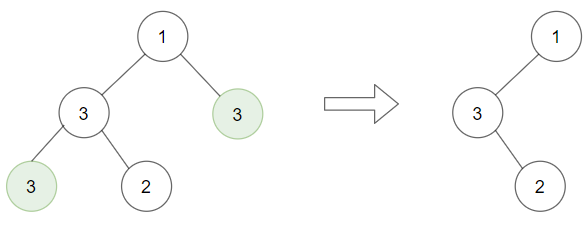Given a binary tree root and an integer target, delete all the leaf nodes with value target.
Note that once you delete a leaf node with value target, if it's parent node becomes a leaf node and has the value target, it should also be deleted (you need to continue doing that until you can't).
Example 1:
Input: root = [1,2,3,2,null,2,4], target = 2 Output: [1,null,3,null,4] Explanation: Leaf nodes in green with value (target = 2) are removed (Picture in left). After removing, new nodes become leaf nodes with value (target = 2) (Picture in center).
Example 2:
Input: root = [1,3,3,3,2], target = 3 Output: [1,3,null,null,2]
Example 3:
Input: root = [1,2,null,2,null,2], target = 2 Output: [1] Explanation: Leaf nodes in green with value (target = 2) are removed at each step.
Example 4:
Input: root = [1,1,1], target = 1 Output: []
Example 5:
Input: root = [1,2,3], target = 1 Output: [1,2,3]
Constraints:
1 <= target <= 1000- The given binary tree will have between
1and3000nodes. - Each node's value is between
[1, 1000].
# Definition for a binary tree node.
# class TreeNode:
# def __init__(self, val=0, left=None, right=None):
# self.val = val
# self.left = left
# self.right = right
class Solution:
def removeLeafNodes(self, root: Optional[TreeNode], target: int) -> Optional[TreeNode]:
def dfs(root, prev):
if root is None:
return
dfs(root.left, root)
dfs(root.right, root)
if root.left is None and root.right is None and root.val == target:
if prev.left == root:
prev.left = None
else:
prev.right = None
p = TreeNode(val=0, left=root)
dfs(root, p)
return p.left/**
* Definition for a binary tree node.
* public class TreeNode {
* int val;
* TreeNode left;
* TreeNode right;
* TreeNode() {}
* TreeNode(int val) { this.val = val; }
* TreeNode(int val, TreeNode left, TreeNode right) {
* this.val = val;
* this.left = left;
* this.right = right;
* }
* }
*/
class Solution {
public TreeNode removeLeafNodes(TreeNode root, int target) {
TreeNode p = new TreeNode(0, root, null);
dfs(root, p, target);
return p.left;
}
private void dfs(TreeNode root, TreeNode prev, int target) {
if (root == null) {
return;
}
dfs(root.left, root, target);
dfs(root.right, root, target);
if (root.left == null && root.right == null && root.val == target) {
if (prev.left == root) {
prev.left = null;
} else {
prev.right = null;
}
}
}
}/**
* Definition for a binary tree node.
* struct TreeNode {
* int val;
* TreeNode *left;
* TreeNode *right;
* TreeNode() : val(0), left(nullptr), right(nullptr) {}
* TreeNode(int x) : val(x), left(nullptr), right(nullptr) {}
* TreeNode(int x, TreeNode *left, TreeNode *right) : val(x), left(left), right(right) {}
* };
*/
class Solution {
public:
TreeNode* removeLeafNodes(TreeNode* root, int target) {
TreeNode* p = new TreeNode(0, root, nullptr);
dfs(root, p, target);
return p->left;
}
void dfs(TreeNode* root, TreeNode* prev, int target) {
if (!root) return;
dfs(root->left, root, target);
dfs(root->right, root, target);
if (!root->left && !root->right && root->val == target)
{
if (prev->left == root) prev->left = nullptr;
else prev->right = nullptr;
}
}
};/**
* Definition for a binary tree node.
* type TreeNode struct {
* Val int
* Left *TreeNode
* Right *TreeNode
* }
*/
func removeLeafNodes(root *TreeNode, target int) *TreeNode {
p := &TreeNode{0, root, nil}
var dfs func(root, prev *TreeNode)
dfs = func(root, prev *TreeNode) {
if root == nil {
return
}
dfs(root.Left, root)
dfs(root.Right, root)
if root.Left == nil && root.Right == nil && root.Val == target {
if prev.Left == root {
prev.Left = nil
} else {
prev.Right = nil
}
}
}
dfs(root, p)
return p.Left
}


